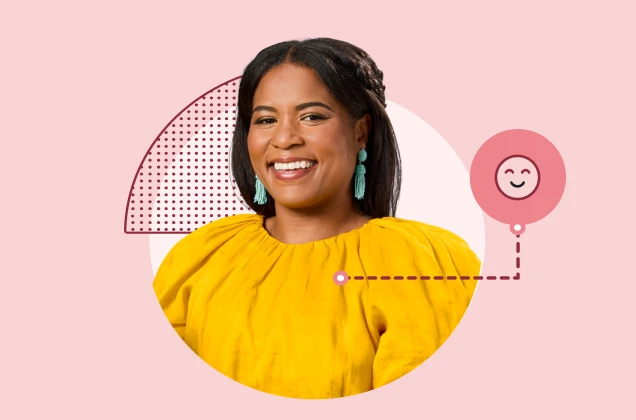How to measure and improve your brand awareness
What is brand awareness?
Brand awareness is the extent to which people in your target market are aware of your business, products, or services. If your business has high brand awareness, customers are more likely to look for your brand when they go to make a purchase, which gives you a competitive advantage over less familiar alternatives.
Let’s take a closer look at the types of brand awareness and why they matter, as well as the different ways you can measure and increase brand awareness with surveys.
Unaided vs. aided brand awareness
Brand awareness encompasses two metrics: unaided brand recall and aided brand recognition. Unaided brand awareness measures the number of people who can recall your business, products, or services when they think of your product category. Aided brand awareness measures the number of people who can recognize your brand in a list of brand names.
While both metrics help you gauge how effective your marketing efforts are, unaided brand awareness is often a more powerful indicator of purchasing behavior than aided brand awareness. If your brand is popular enough to come to mind when people think about your product category in general, then your business has strong brand equity that it can use to boost profit margins.
Learn more about unaided vs. aided brand awareness.
Why brand awareness is important
Businesses can turn to brand awareness to both measure the effectiveness of their marketing campaigns and benchmark their brand equity. Brand awareness metrics help you understand the consumer behavior of your target market, plan marketing campaigns based on that behavior, manage your brand, and develop long-term marketing strategies.
Say, for example, that your business ran a series of online advertisements to promote a new brand of bottled water. To tell if the marketing campaign was effective, you could measure people’s awareness of your brand as a bottled water company. If brand recognition is high, your campaign was effective. If brand recognition is low, your business might have to take a new marketing approach.
Need help coming up with an effective marketing strategy?
Build your campaigns on solid data with professional market research services.
Brand awareness is the foundation of brand equity, which is the extra value that a business gets from selling a product with a recognizable name, compared to the generic alternative. Once a customer is aware of your brand, they’ll begin to seek you out, and then to prefer you to other brands. Brand equity makes it easier to charge higher prices for products, retain customers, and expand your product line.
How to measure brand awareness
Even though SurveyMonkey has found that 80% of marketers think measuring brand awareness is “extremely” or “very” important, few know how to use it to judge the success of their marketing campaigns. More than 75% of marketers say they don’t know how many people in their target market are aware of their brand, and almost 70% say they don’t even know how to measure brand awareness.
Luckily, it’s easy to test your target market with a brand awareness survey. This survey should include both open-ended and multiple-choice questions so you can gauge unaided and aided brand awareness. To ensure your results are statistically significant, use SurveyMonkey Audience to find a representative sample of your target market.
In open-ended questions, ask respondents to recall brand names, brand attributes, and other product category associations. These questions give you insights into how your target market views your business, products, or services in the most general sense. Ask open-ended questions first, so that the content of your other questions doesn’t influence the results.
Here’s an example of an open-ended brand awareness question:
What bottled water brands are you familiar with? (Please type your answers in the box below)
In multiple-choice questions, on the other hand, you’ll want to test whether respondents can recognize your brand in a list of your competitors’ names. Here’s how that might look:
Which of the following bottled water brands have you heard of? (Select all that apply)
- Aquafina
- Dasani
- SmartWater
- [Insert your brand name]
- Fiji
You may also want to include questions that dive deeper into your competitors’ brand awareness. These competitive insights give you an edge on your competition and help you come up with marketing strategies that are more responsive to current market conditions.
Ready to find out where your business stands on brand awareness? Get started with our brand awareness survey template.
How to increase brand awareness
The results of your brand awareness survey will help you come up with effective strategies for increasing your brand awareness. If the conditions are right, any kind of marketing can increase brand awareness. Here are just a few ideas:
Social media
Social media is a particularly effective way to grow your brand awareness, since it makes it easy to build customer networks and spread information about your brand to new people. In fact, more than 50% of your brand’s reputation now comes from online sociability. A social campaign like a contest or a brand hashtag is a great way to help your brand go viral. Plus, you can use your social media platforms to show off your brand’s voice and continuously engage with customers.
Sponsored events
Sponsoring events guarantees that your name will get in front of a large number of people in your target market. For example, Gatorade sponsors large events, like the Ironman World Championship, smaller local events, like half marathons, as well as the Player of the Year high school athlete contest. This not only connects Gatorade with people in its target market, it also helps the brand become associated with the event’s personality, including characteristics like endurance, excellence, and dedication.
Guest content
Like sponsoring events, collaborating on guest content introduces your brand to new audiences. Whether you’re guest posting a blog or inviting an influencer to contribute on your own company blog, it’s an opportunity to build brand awareness and industry relationships simultaneously. Make it a point to diversify your content by creating videos, infographics, and guides that can be easily shared on your social media and your partner’s. Above all, make sure your guest content is unique, helpful, and representative of your brand.
No matter what brand awareness strategy you try, be sure to benchmark all of your marketing campaigns by routinely testing your target market with a brand awareness survey. This can be done on a schedule (for example, biannually) or after specific marketing campaigns to evaluate their impact. By measuring your brand awareness at least two times a year, you can build more effective marketing strategies that are firmly grounded in up-to-date metrics.
Oppdag flere ressurser

Merkevaresjef
Merkevaresjefer kan bruke dette verktøyet til å forstå målgruppen, vokse merket og bevise ROI.

Se SurveyMonkey-løsninger for forbrukerprodukter og -tjenester
Bransjen for forbrukerprodukter og -tjenester, deriblant forbruksvarer, reiseliv, hotell og restaurant, benytter SurveyMonkey-innsikt for å forme fremtidige produkter.

Utforsk SurveyMonkeys løsninger for detaljhandel
Se hvordan SurveyMonkey hjelper detaljhandelen med å finne ut av nye markedstrender, utvikle produkter som begeistrer og bygge populære merkevarer.

Se SurveyMonkeys løsninger for firmaer innen profesjonelle tjenester
Se hvordan organisasjoner innen profesjonelle tjenester bruker SurveyMonkey for å få innsikt om kunder og marked.